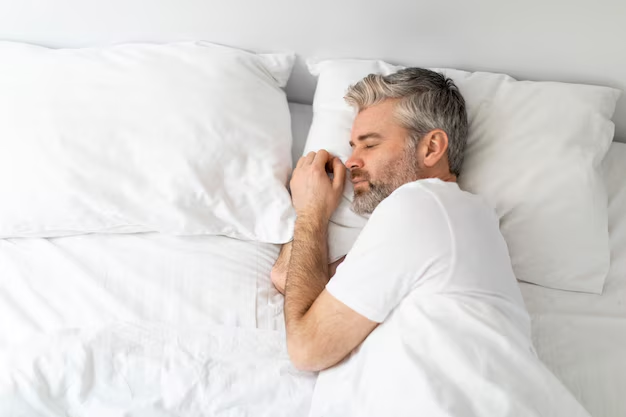How to improve sleep after 40 is a question that troubles many people. As we age, sleep tends to become lighter, falling asleep takes longer, and waking up in the middle of the night happens more often. Let’s explore why this occurs and what you can do to restore restful, refreshing sleep.
Why Am I Sleeping Poorly?
Hormonal changes after 40
After the age of 40, the body undergoes significant hormonal shifts. In women, levels of estrogen and progesterone decline, while in men, testosterone levels decrease. These hormones influence not only metabolism and mood but also the quality of sleep.
Research shows that lower progesterone in women can lead to frequent night awakenings, while declining testosterone in men is linked to shallower sleep and increased daytime fatigue (Harvard Health).
Stress and lifestyle
Life after 40 often means balancing work, family, and caring for aging parents. This constant pressure raises cortisol—the stress hormone—that directly interferes with falling asleep and contributes to insomnia (NIH study).
Chronic conditions and pain
Chronic illnesses such as hypertension, diabetes, or arthritis become more common with age. Back or joint pain is one of the leading causes of disrupted sleep, as it prevents the body from fully relaxing at night. For many people wondering how to improve sleep after 40, managing chronic pain becomes the first step.

How Sleep Problems Show Up
Struggling to fall asleep
Many people feel exhausted at the end of the day but still lie awake. This often happens because melatonin—the “sleep hormone”—is produced less as we age (WebMD).
Waking up at night
Frequent awakenings may be related to sleep apnea, hormonal changes, or elevated stress levels.
Feeling tired even after sleep
Even 7–8 hours in bed doesn’t always guarantee energy. Studies from the University of California have shown that deep sleep phases shorten with age, leaving the body less restored.
Insomnia After 40: The Main Causes
Daily rhythm and habits
Going to bed and waking up at different times confuses your internal clock. After 40, irregular sleep patterns tend to have a stronger impact on overall health.
Eating before bedtime
One of the most overlooked causes of poor sleep after 40 is eating late at night. Many people know that late dinners affect weight, but few realize they also disrupt sleep quality.
When you eat heavy food an hour or two before bed, your body spends much of the night digesting instead of fully resting. Digestion requires significant energy, keeping your stomach, liver, and intestines active while you sleep.
The result: restless, shallow sleep and waking up feeling tired even after a full night in bed. If you’re asking yourself how to improve sleep after 40, one of the easiest changes is finishing dinner at least four hours before bedtime.
Lack of activity
As we age, physical activity often decreases, and this directly impacts sleep. Regular exercise helps you fall asleep faster and promotes deeper, more restorative rest.
What Really Helps Improve Sleep
Sleep hygiene and routine
Going to bed and waking up at the same time every day helps reset your body’s natural rhythm.
Relaxation
A warm bath, an evening walk, or a short meditation can reduce stress levels and prepare the body for rest.
Moderate physical activity
Daytime exercise improves sleep quality. Just avoid intense workouts too late in the evening, as they can overstimulate your body.

When to See a Doctor
Chronic insomnia symptoms
If sleep problems persist for more than three weeks and affect daily life, it’s time to consult a healthcare professional.
Possible underlying conditions
Poor sleep may be a sign of issues like sleep apnea, depression, or thyroid disorders. Medical evaluation can help identify hidden causes.
Personal Experience: How I Improved My Sleep in Midlife
A few years ago, I started waking up around 4–5 a.m. and couldn’t fall back asleep. At first, I thought it was just stress, but then I changed some habits: I cut out coffee after lunch and became more active. Once I added strength training and endurance exercises, my sleep became deeper, and nighttime awakenings almost disappeared.
Exercise not only helped me fall asleep more easily but also improved my hormonal balance. Regular strength workouts boost testosterone levels, and low testosterone is one of the key reasons men over 40 often struggle with poor sleep.
If you’d like to learn more about how strength training helps raise testosterone and build muscle, check out my article: How to Build Muscle After 40.
Final Thoughts: Can You Restore Sleep After 40?
Yes, you can. The key is to recognize hormonal changes, stick to a healthy routine, and stay physically active. With the right habits, figuring out how to improve sleep after 40 becomes much easier, and restful nights return.

